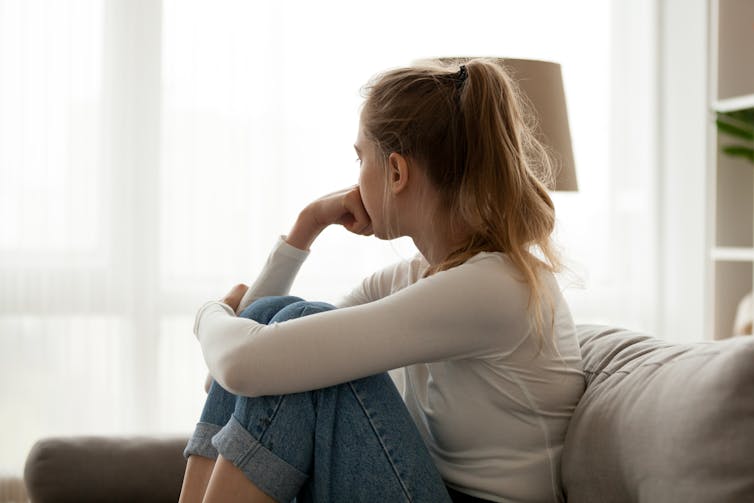Has the pandemic changed our personalities? New research suggests we’re less open, agreeable and conscientious
For many of us, some personality traits stay the same throughout our lives while others change only gradually. However, evidence shows that significant events in our personal lives which induce severe stress or trauma can be associated with more rapid changes in our personalities.
A new study, published in PLOS ONE, suggests the COVID pandemic has indeed triggered much greater shifts in personality than we would expect to have seen naturally over this period. In particular, the researchers found that people were less extroverted, less open, less agreeable and less conscientious in 2021 and 2022 compared with before the pandemic.
This study included more than 7,000 participants from the US, aged between 18 and 109, who were assessed before the pandemic (from 2014 onwards), early in the pandemic in 2020, and then later in the pandemic in 2021 or 2022.
At each time point, participants completed the “Big Five Inventory”. This assessment tool measures personality on a scale across five dimensions: extroversion versus introversion, agreeableness versus antagonism, conscientiousness versus lack of direction, neuroticism versus emotional stability, and openness versus closedness to experience.
There weren’t many changes between pre-pandemic and 2020 personality traits. However, the researchers found significant declines in extroversion, openness, agreeableness and conscientiousness in 2021/2022 compared with before the pandemic. These changes were akin to a decade of normal variation, suggesting the trauma of the COVID pandemic had accelerated the natural process of personality change.
Interestingly, younger adults’ personalities changed the most in the study. They showed marked declines in agreeableness and conscientiousness, and a significant increase in neuroticism in 2021/2022 compared with pre-pandemic. This may be due in part to social anxiety when emerging back into society, having missed out on two years of normality.
Personality and wellbeing
Many of us became more health-conscious during the pandemic, for example by eating better and doing more exercise. A lot of us sought whatever social connections we could find virtually, and tried to refocus our attention on psychological, emotional and intellectual growth – for example, by practising mindfulness or picking up new hobbies.
Nonetheless, mental health and wellbeing decreased significantly. This makes sense given the drastic changes we went through.
Notably, personality significantly impacts our wellbeing. For example, people who report high levels of conscientiousness, agreeableness or extroversion are more likely to experience the highest level of wellbeing.
So the personality changes detected in this study may go some way to explaining the decrease in wellbeing we’ve seen during the pandemic.

If we look more closely, the pandemic appears to have negatively affected the following areas:
-
our ability to express sympathy and kindness towards others (agreeableness);
-
our capacity to be open to new concepts and willing to engage in novel situations (openness);
-
our tendency to seek out and enjoy other people’s company (extraversion);
-
our desire to strive towards our goals, do tasks well or take responsibilities towards others seriously (conscientiousness).
All of these traits influence our interaction with the environment around us, and as such, may have played a role in our wellbeing decline. For example, working from home may have left us feeling demotivated and as though our career was going nowhere (lower conscientiousness). This in turn may have affected our wellbeing by making us feel more irritable, depressed or anxious.
What next?
Over time, our personalities usually change in a way that helps us adapt to ageing and cope more effectively with life events. In other words, we learn from our life experiences and this subsequently impacts our personality. As we age, we generally see increases in self-confidence, self-control and emotional stability.
However, participants in this study recorded changes in the opposite direction to the usual trajectory of personality change. This is understandable given that we faced an extended period of difficulties, including constraints on our freedoms, lost income and illness. All these experiences have evidently changed us – and our personalities.
This study provides us with some very useful insights into the impacts of the pandemic on our psyche. These impacts may subsequently influence many aspects of our lives, such as wellbeing.
Knowledge allows us to make choices. So you might like to take the time to reflect on your experiences over the past few years, and how these personality changes may have affected you.
Any changes may well have protected you during the height of the pandemic. However, it’s worth asking yourself how useful these changes are now that the acute phase of the pandemic is behind us. Do they still serve you well, or could you try to rethink your perspective?
Jolanta Burke, Senior Lecturer, Centre for Positive Psychology and Health, RCSI University of Medicine and Health Sciences
This article is republished from The Conversation under a Creative Commons license. Read the original article.

